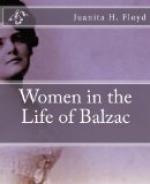“Yesterday I went to see Madame Recamier, whom I found ill but wonderfully bright and kind. I have heard that she did much good, and acted very nobly in being silent and making no complaint of the ungrateful beings she has met. No doubt she saw upon my face a reflection of what I thought of her, and without explaining to herself this little sympathy, she was charming.”
Although one would not suspect Madame Hanska of being jealous of Madame Recamier, perhaps it is because she wished to foedorize herself that Balzac writes:
“Mon Dieu! do not be jealous of any one. I have not been to see Madame Recamier or any one else. . . . As to my relations with the person you speak of, I never had any that were tender; I have none now. I answered a very unimportant letter, and apropos of a sentence, I explained myself; that was all. There are relations of politeness due to women of a certain rank whom one has known; but a visit to Madame Recamier is not, I suppose, relations, when one visits her once in three months.”
One of the famous women whom Balzac met soon after he began to acquire literary fame was the Duchesse de Dino, who was married to Talleyrand’s nephew in 1809.
“When her husband’s uncle became French Ambassador at Vienna in 1814, she went with him as mistress of the embassy. When he was sent to London in 1830, she accompanied him in the same capacity. She lived with him till his death in 1838, entirely devoted to his welfare, and she had given us in these pages a picture of the old Talleyrand which is among the masterpieces of memoir-writing. From this connection she was naturally for many years in the very heart of political affairs, as no one was, save perhaps that other Dorothea of the Baltic, the Princess de Lieven. To great beauty and spirit she added unusual talents, and in the best sense was a great lady of the haute politique.”
Balzac had met her in the salon of Madame Appony, but had never visited her in her home until 1836, when he went to Rochecotte to see the famous Prince de Talleyrand, having a great desire to have a view of the “witty turkeys who plucked the eagle and made it tumble into the ditch of the house of Austria.” Several years later, on his return from St. Petersburg, he stopped in Berlin, where he was invited to a grand dinner at the home of the Count and Countess Bresson. He gave his arm to the Duchesse de Talleyrand (ex-Dino), whom he thought the most beautiful lady present, although she was fifty-two years of age.
The Duchesse has left this appreciation of the novelist: “. . . his face and bearing are vulgar, and I imagine his ideas are equally so. Undoubtedly, he is a very clever man, but his conversation is neither easy nor light, but on the contrary, very dull. He watched and examined all of us most minutely.”




